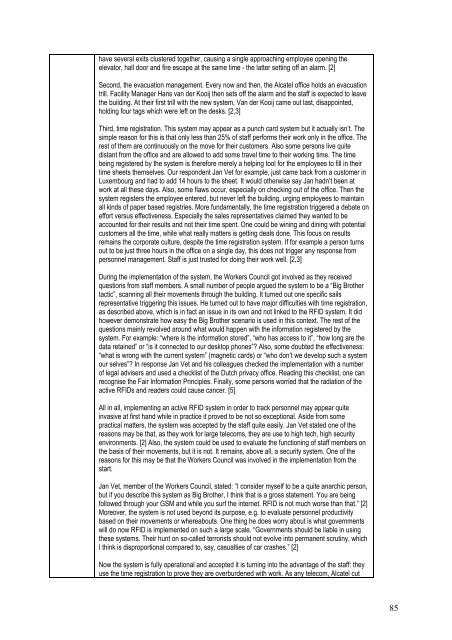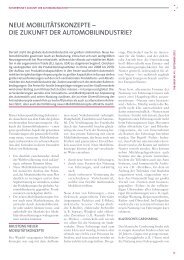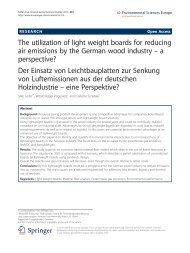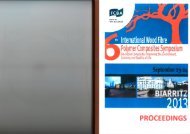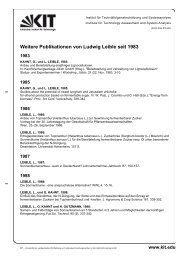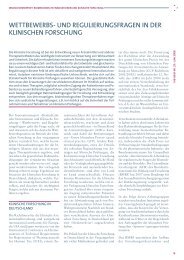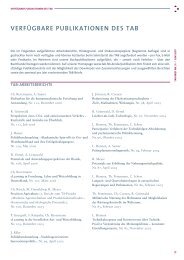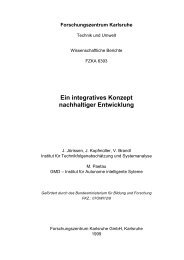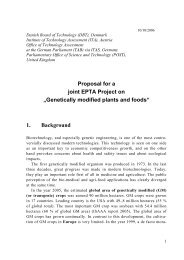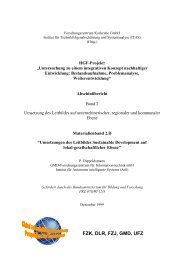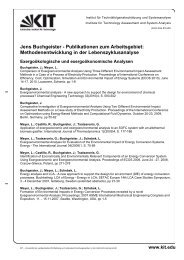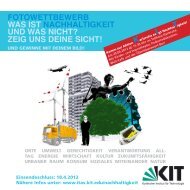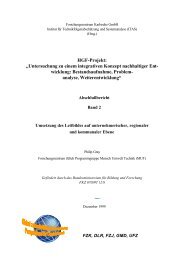Results: RFID and Identity Management in everyday life - ITAS
Results: RFID and Identity Management in everyday life - ITAS
Results: RFID and Identity Management in everyday life - ITAS
You also want an ePaper? Increase the reach of your titles
YUMPU automatically turns print PDFs into web optimized ePapers that Google loves.
have several exits clustered together, caus<strong>in</strong>g a s<strong>in</strong>gle approach<strong>in</strong>g employee open<strong>in</strong>g the<br />
elevator, hall door <strong>and</strong> fire escape at the same time - the latter sett<strong>in</strong>g off an alarm. [2]<br />
Second, the evacuation management. Every now <strong>and</strong> then, the Alcatel office holds an evacuation<br />
trill. Facility Manager Hans van der Kooij then sets off the alarm <strong>and</strong> the staff is expected to leave<br />
the build<strong>in</strong>g. At their first trill with the new system, Van der Kooij came out last, disappo<strong>in</strong>ted,<br />
hold<strong>in</strong>g four tags which were left on the desks. [2,3]<br />
Third, time registration. This system may appear as a punch card system but it actually isn’t. The<br />
simple reason for this is that only less than 25% of staff performs their work only <strong>in</strong> the office. The<br />
rest of them are cont<strong>in</strong>uously on the move for their customers. Also some persons live quite<br />
distant from the office <strong>and</strong> are allowed to add some travel time to their work<strong>in</strong>g time. The time<br />
be<strong>in</strong>g registered by the system is therefore merely a help<strong>in</strong>g tool for the employees to fill <strong>in</strong> their<br />
time sheets themselves. Our respondent Jan Vet for example, just came back from a customer <strong>in</strong><br />
Luxembourg <strong>and</strong> had to add 14 hours to the sheet. It would otherwise say Jan hadn’t been at<br />
work at all these days. Also, some flaws occur, especially on check<strong>in</strong>g out of the office. Then the<br />
system registers the employee entered, but never left the build<strong>in</strong>g, urg<strong>in</strong>g employees to ma<strong>in</strong>ta<strong>in</strong><br />
all k<strong>in</strong>ds of paper based registries. More fundamentally, the time registration triggered a debate on<br />
effort versus effectiveness. Especially the sales representatives claimed they wanted to be<br />
accounted for their results <strong>and</strong> not their time spent. One could be w<strong>in</strong><strong>in</strong>g <strong>and</strong> d<strong>in</strong><strong>in</strong>g with potential<br />
customers all the time, while what really matters is gett<strong>in</strong>g deals done. This focus on results<br />
rema<strong>in</strong>s the corporate culture, despite the time registration system. If for example a person turns<br />
out to be just three hours <strong>in</strong> the office on a s<strong>in</strong>gle day, this does not trigger any response from<br />
personnel management. Staff is just trusted for do<strong>in</strong>g their work well. [2,3]<br />
Dur<strong>in</strong>g the implementation of the system, the Workers Council got <strong>in</strong>volved as they received<br />
questions from staff members. A small number of people argued the system to be a “Big Brother<br />
tactic”, scann<strong>in</strong>g all their movements through the build<strong>in</strong>g. It turned out one specific sails<br />
representative trigger<strong>in</strong>g this issues. He turned out to have major difficulties with time registration,<br />
as described above, which is <strong>in</strong> fact an issue <strong>in</strong> its own <strong>and</strong> not l<strong>in</strong>ked to the <strong>RFID</strong> system. It did<br />
however demonstrate how easy the Big Brother scenario is used <strong>in</strong> this context. The rest of the<br />
questions ma<strong>in</strong>ly revolved around what would happen with the <strong>in</strong>formation registered by the<br />
system. For example: “where is the <strong>in</strong>formation stored”, “who has access to it”, “how long are the<br />
data reta<strong>in</strong>ed” or “is it connected to our desktop phones”? Also, some doubted the effectiveness:<br />
“what is wrong with the current system” (magnetic cards) or “who don’t we develop such a system<br />
our selves”? In response Jan Vet <strong>and</strong> his colleagues checked the implementation with a number<br />
of legal advisers <strong>and</strong> used a checklist of the Dutch privacy office. Read<strong>in</strong>g this checklist, one can<br />
recognise the Fair Information Pr<strong>in</strong>ciples. F<strong>in</strong>ally, some persons worried that the radiation of the<br />
active <strong>RFID</strong>s <strong>and</strong> readers could cause cancer. [5]<br />
All <strong>in</strong> all, implement<strong>in</strong>g an active <strong>RFID</strong> system <strong>in</strong> order to track personnel may appear quite<br />
<strong>in</strong>vasive at first h<strong>and</strong> while <strong>in</strong> practice it proved to be not so exceptional. Aside from some<br />
practical matters, the system was accepted by the staff quite easily. Jan Vet stated one of the<br />
reasons may be that, as they work for large telecoms, they are use to high tech, high security<br />
environments. [2] Also, the system could be used to evaluate the function<strong>in</strong>g of staff members on<br />
the basis of their movements, but it is not. It rema<strong>in</strong>s, above all, a security system. One of the<br />
reasons for this may be that the Workers Council was <strong>in</strong>volved <strong>in</strong> the implementation from the<br />
start.<br />
Jan Vet, member of the Workers Council, stated: “I consider myself to be a quite anarchic person,<br />
but if you describe this system as Big Brother, I th<strong>in</strong>k that is a gross statement. You are be<strong>in</strong>g<br />
followed through your GSM <strong>and</strong> while you surf the <strong>in</strong>ternet. <strong>RFID</strong> is not much worse than that.” [2]<br />
Moreover, the system is not used beyond its purpose, e.g. to evaluate personnel productivity<br />
based on their movements or whereabouts. One th<strong>in</strong>g he does worry about is what governments<br />
will do now <strong>RFID</strong> is implemented on such a large scale. “Governments should be liable <strong>in</strong> us<strong>in</strong>g<br />
these systems. Their hunt on so-called terrorists should not evolve <strong>in</strong>to permanent scrut<strong>in</strong>y, which<br />
I th<strong>in</strong>k is disproportional compared to, say, casualties of car crashes.” [2]<br />
Now the system is fully operational <strong>and</strong> accepted it is turn<strong>in</strong>g <strong>in</strong>to the advantage of the staff: they<br />
use the time registration to prove they are overburdened with work. As any telecom, Alcatel cut<br />
85


